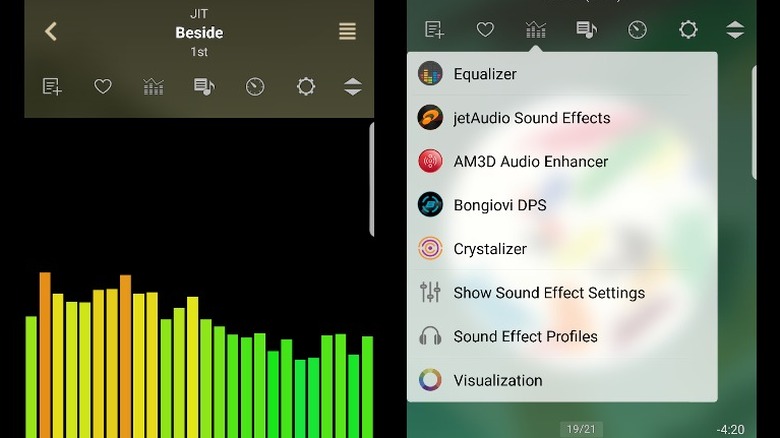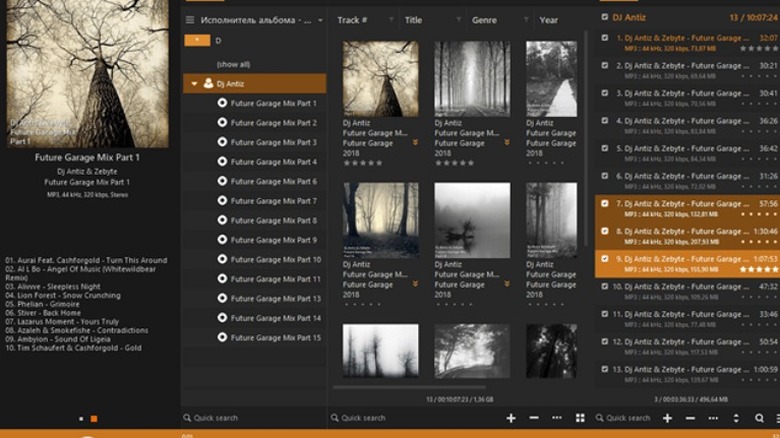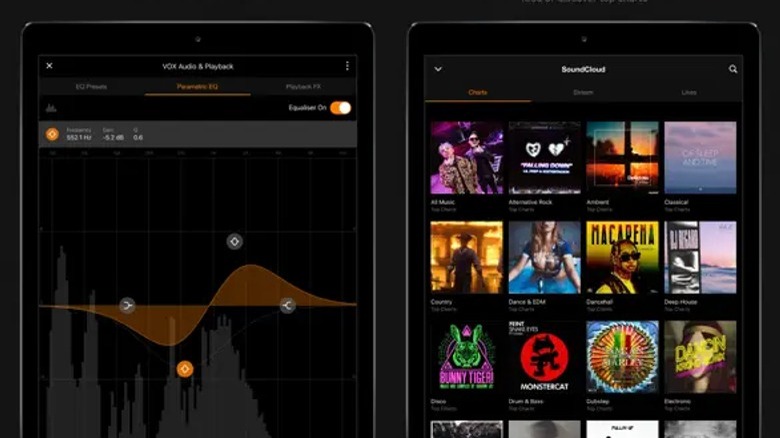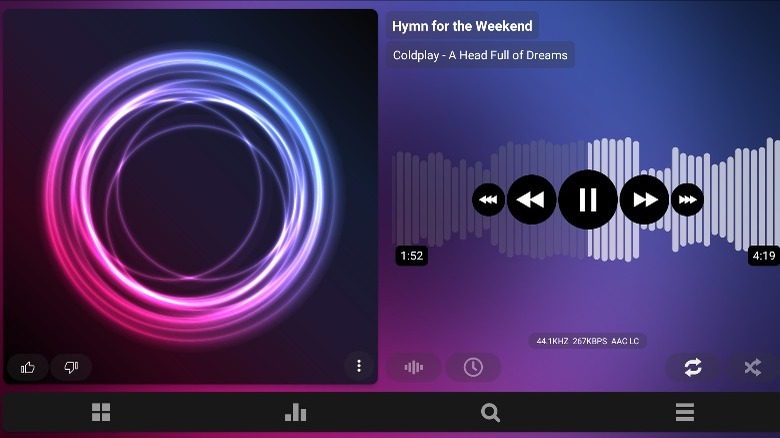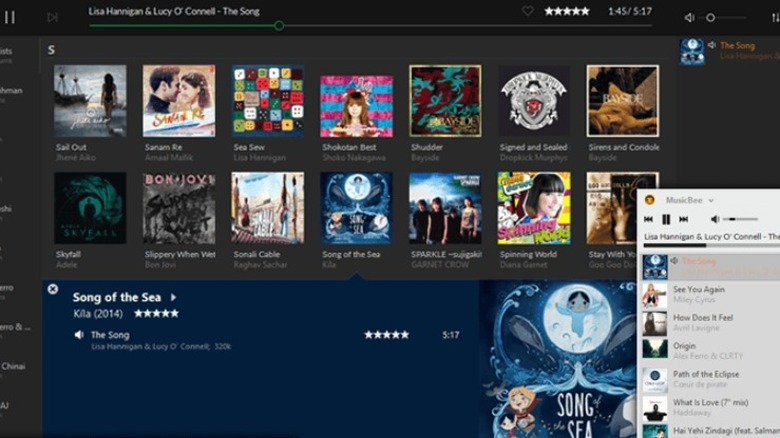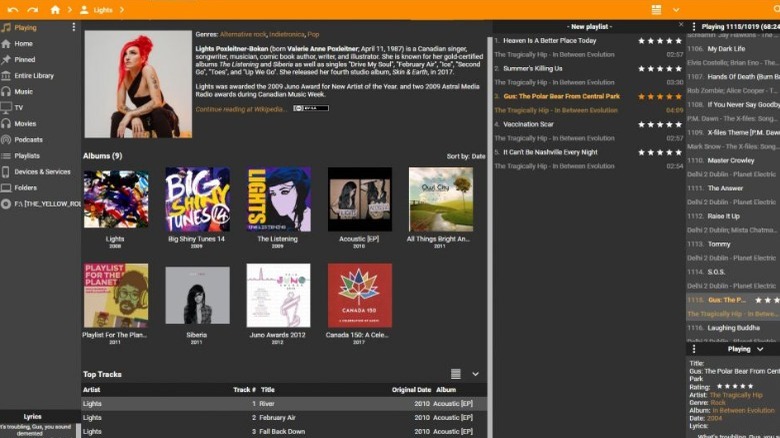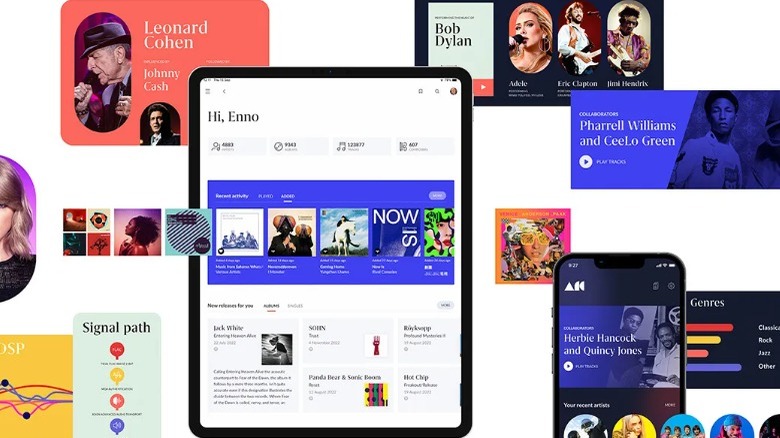Ditch Spotify: 8 Of The Best Local Music Players, Ranked
The world of music is now very much dominated by streaming services. While there are still some people who prefer to listen to their music collection on a physical medium like vinyl, the sheer convenience and choice available on services such as Spotify, Apple Music, and Amazon Music have made streaming the go-to choice for many people.
However, there are a number of downsides to using streaming options, including a lower quality of sound and the need for a consistent online connection. That's not to mention the subscription cost associated with the likes of Spotify. Fortunately, there are some alternatives on offer across PC and mobile devices that can take your listening experience to a whole new level.
Whether it is a customizable user interface, more audio settings, or the ability to get more information about the songs you are listening to, local music players are a great option for those looking to ditch Spotify and try something new. Here are some of the best offerings, all of which we have tested ourselves to judge their quality.
8. JetAudio
One of the oldest music players still in existence, JetAudio was first released on Windows more than 25 years ago. Still going strong today, it is now available on Android and iOS in addition to PC, making it a good choice for those who listen to their music across a range of devices. There's a free option as well as a paid premium offering, which adds extra sound effects and removes advertisements from the software to give you a cleaner user interface without clutter.
Unlike many streaming services, the JetAudio app can do a lot more than just play music. It's possible to stream radio channels, watch and transcode videos, and even record sound directly on PC or mobile devices. There's also a dedicated lyrics viewer inside the application, which offers both synchronized and unsynchronized lyrics to the currently playing song. Users can also bookmark music so jetAudio will remember exactly where you were up to in a song if it is closed down.
JetAudio's close similarity to the long-gone media player Winamp means that many of the plug-ins and extensions developed for Winamp should work with this player on the PC. That opens up a lot of additional functions that can be added to the player from external sources. Additionally, it has an extensive range of sound effects, including special effects such as flange and phase shifting, as well as an equalization filter and BBE high-definition sound enhancement.
7. AIMP
AIMP is another audio option that has been around for a long time. Initially launched way back in 2006 by a single developer, the software now works on Windows operating systems as well as a variety of Android devices. Of course, that does mean that those wanting to play their music libraries on Mac, Linux, or iOS will have to look elsewhere as these platforms are not officially supported by AIMP.
Those who can use AIMP, though, will get access to a sophisticated music player that can do some pretty impressive things. One unique feature of AIMP is its ability to store audio data from streamed music or even internet radio. This allows it to cache quite a significant amount of audio so that you won't be interrupted by momentary connection outages. The software also features smart playlists, with AIMP creating playlists based on your mood and tastes.
Supporting almost every imaginable audio format and able to take on additional functions such as an alarm clock setting, AIMP also comes with a vast array of options to tinker with the sound, including an extensive equalizer. Those wanting to convert their music into one particular format will be able to do so quickly and painlessly with the built-in converter. In addition, the program can be loaded onto a USB stick so you can always have it handy when moving around.
6. Foobar2000
Foobar2000 may look fairly basic, but this is actually a design choice that gives the audio player its standout feature as it can therefore utilize a modular design. This means that almost every element of Foobar2000 can be altered relatively easily to give you precisely the user interface and visual that you desire. Having first launched more than 20 years ago, it also has a rather large collection of add-ons and extensions.
While this isn't an option for someone who just wants a quick and simple music-playing experience, it does offer a lot of flexibility and some rather powerful audio features. These include equalizers, crossfaders, and resampling tools, with the software also offering proper gapless playback. Foobar2000 is also consistently updated, so you can be sure that the software shouldn't suddenly stop working. In fact, a major revision happened in 2023 that finally saw the official release of Foobar2000 2.0 after several years of testing, which is available for Android and iOS devices.
Like many other modern music players, Foobar2000 has extensive automatic tagging capabilities and excels when it comes to ripping CDs, as it will add metadata and sort songs as soon as they have been ripped. Combine this with its support for a wide range of formats and it becomes an excellent option for audiophiles who don't mind putting in some work to get the results they want.
5. Vox
Vox is a music player that has been specifically designed for Apple users, so it's only available on Mac and iOS devices. With its sleek interface and lightning-fast features, VOX is among the best alternatives to iTunes that anyone on an iPhone or MacBook can get access to. Where Vox really differentiates itself as a music player, though, is with its focus on Hi-Res audio and support for formats such as FLAC, ALC, and DSD.
It also comes with many of the features you'd expect from a great music player, such as an equalizer that can be adjusted on the fly and support for BS2B, meaning that sound played over headphones should be much improved. There's CarPlay support for users who love to play music while they are driving and the ability to combine playlists from multiple sources — such as YouTube and SoundCloud — in one location.
Users can download and run Vox for free but there is also a premium version available. This gives access to the BASS audio engine, which has been designed to include advanced audio settings to allow you to get the best possible sound from Hi-Res audio tracks. This paid tier also provides unlimited cloud storage for all your uncompressed audio files, the ability to play more than 30,000 radio stations, and automatically synced playlists across all devices.
4. Poweramp
Designed specifically for Android devices, Poweramp is a music player that describes itself with one word — powerful. To get access to it, you'll need to be willing to pay the $7.99 unlock fee to get the full version, although a 15-day trial is available as well, so you don't have to commit until you've given it a good tryout. If you are willing to pay for this app, you'll be provided with a suite of features and one of the best-looking music players on the Google Play Store, in addition to frequent updates.
There are some interesting quality-of-life features as well that make Poweramp an appealing choice. By tweaking some settings, you can make the app resume your last played song when you reconnect headphones or prevent other apps from being able to pause your music. Android Auto support makes it work seamlessly while driving. Of course, it also supports gapless and lossless audio formats as well as being able to grab and display lyrics from a number of third-party sites.
Poweramp also comes with a lot of customization options for those who want to play around with the look and feel of the app. Want to install a theme from an external source? You can do that from right within the app itself. It's even possible to move around practically every element of the UI to suit your needs and switch up the visualizer completely, making it more user-friendly than most other premium options on the market.
3. MusicBee
Of all the free music players on the market that are available for your PC, MusicBee might well be the best available. Working well as a way of getting great-sounding music out of your system, it utilizes both a 10-band and 15-band equalizer, with support for DSP effects and systems using 5.1 surround sound. Best of all, though, is the way it will automatically add tag information to any music you add and help sort out messy collections with duplicate songs.
With less bloat than some of its competitors, as well as a simpler user interface that is very easy to navigate, MusicBee doesn't take up too much of your device's resources either. This ensures it always runs fast and without any noticeable problems with lag or delays. The software will also sync all types of audio content across different supported devices, whether it is music, audiobooks, or podcasts — helpful if you switch media a lot during the course of a day and don't want to have to worry about finding where you were up to.
For those who really want to customize the MusicBee experience, there are a number of add-ons that can be downloaded from the official site. These include everything from skins, so you can switch up how the player looks, to more advanced plugins and visualizers to take our listening to the next level. If something doesn't work the way you want it to in MusicBee, there's a good chance there will be an add-on that can fix the issue for you.
2. MediaMonkey
The main selling point of MediaMonkey, which describes itself as a media manager, is the ability to organize and categorize all of your music-related files. It supports a vast number of different formats and file types to do that and is not just focused exclusively on music. The software has also been designed to work with podcasts, audiobooks, and even music videos, putting all of your audio-related content in the same place so that you can manage it together efficiently and effectively.
MediaMonkey can automatically find and add any missing metadata from your content by taking files from any source you provide, including ripped CDs, music on a cloud service, or local audio files. It will then organize it correctly and make sure that everything from tags to album covers is correct and high quality. The software can then convert files into formats that are compatible with your favorite devices and allow you to stream content to any device in your network. This makes it an ideal choice for anyone who has a massive music collection and doesn't want to spend an eternity getting it properly sorted.
What's great about MediaMonkey is that it works seamlessly across PC and Android mobile devices, sharing libraries and data so you always have an organized music collection wherever you go, although Apple users are out of luck. Thanks to its open nature when it comes to extensions and scripting, MediaMonkey is fully customizable and those with some basic coding knowledge can even create their own extensions to personalize the experience even more.
1. Roon
Roon is not simply a local music player like some of the other options included in this article. It is far more sophisticated than that and can work with a variety of streaming services in addition to playing music files locally. The system uses a central server that can either be purchased separately or operated from a computer, allowing users to play their music on any device they want over various types of connections. It doesn't matter whether you are using mobile devices such as smartphones or computers running a wide array of operating systems — Roon should work flawlessly.
Where Roon really stands out, though, is in its extra features and impressive user interface. Everything in this piece of software looks sleek and stylish, with Roon also working as a curator to bring you more information about the music you are listening to. This includes everything from liner notes to rich metadata, adding an extra layer of detail to your favorite songs and artists that the likes of Spotify simply cannot compete with.
The music player also promises higher-quality sound than you can expect with your standard streaming services. With its support for almost all formats and encoding, in addition to its MUSE audio engine, listeners can be sure they are getting some of the best sound possible for their music collections. It also comes with some nifty tools to make your sound setup perform at its best, with optimization and sound shaping systems that are fairly easy to use.

